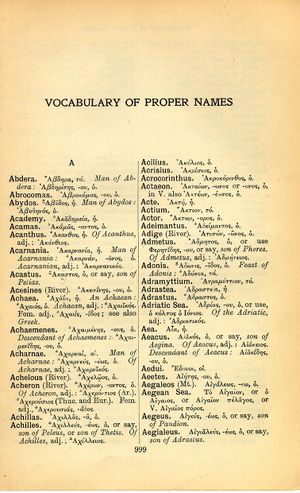Abdera
Μέλλοντα ταῦτα. Τῶν προκειμένων τι χρὴ πράσσειν· μέλει γὰρ τῶνδ' ὅτοισι χρὴ μέλειν → Tomorrow is tomorrow. Future cares have future cures, and we must mind today.
English > Greek (Woodhouse)
Ἄβδηρα, τά.
Man of Abdera: Ἀβδηρίτης, -ου, ὁ.
Latin > English (Lewis & Short)
Abdēra: ōrum, n., and ae, f., =Ἄβὀηρα.
I Abdera, a town on the southern coast of Thrace, not far from the mouth of the Nestus, noted for the stupidity of its inhabitants. It was the birthplace of the philosophers Protagoras, Democritus, and Anaxarchus; n., Liv. 45, 29, 6; Gell. 5, 3, 3; f., Ov. Ib. 469; Plin. 25, 8, 53, § 94 dub.; 4, 11, 18, § 42: hic Abdera, non tacente me, here was Abdera itself, Cic. Att. 4, 17, 3 (4, 16, 6).—
2 Folly, stupidity, madness, Cic. l. l. (cf.: id est Ἀβὀηριτικόν, i. e. stupid, id. Att. 7, 7, 4, and Arn. 5, p. 164; Juv. 10, 50; Mart. 10, 25, 4).—
B Hence, derivv.
1 Abdērīta and Abdērītes, ae, m., =Ἀβὀηριτς, an Abderite: Democritus Abderites, Laber. ap. Gell. 10, 17: Abderites Protagoras, Cic. N. D. 1, 23, 63; cf. id. Brut. 8: de Protagora Abderita, id. de Or. 3, 32, 128: Abderitae legati, Liv. 43, 4, 8; cf. id. § 12 sq.; Vitr. 7, 5, 6; Just. 15, 2 al.—
2 Ab-dērītānus, a, um, adj., of Abdera, meton. for stupid, foolish: Abderitanae pectora plebis habes, Mart. 10, 25, 4.—
II A city of Hispania Baetlca, on the southern coast, now Adra, Mel. 2, 6, 7; Plin. 3, 1, 3, § 8.

